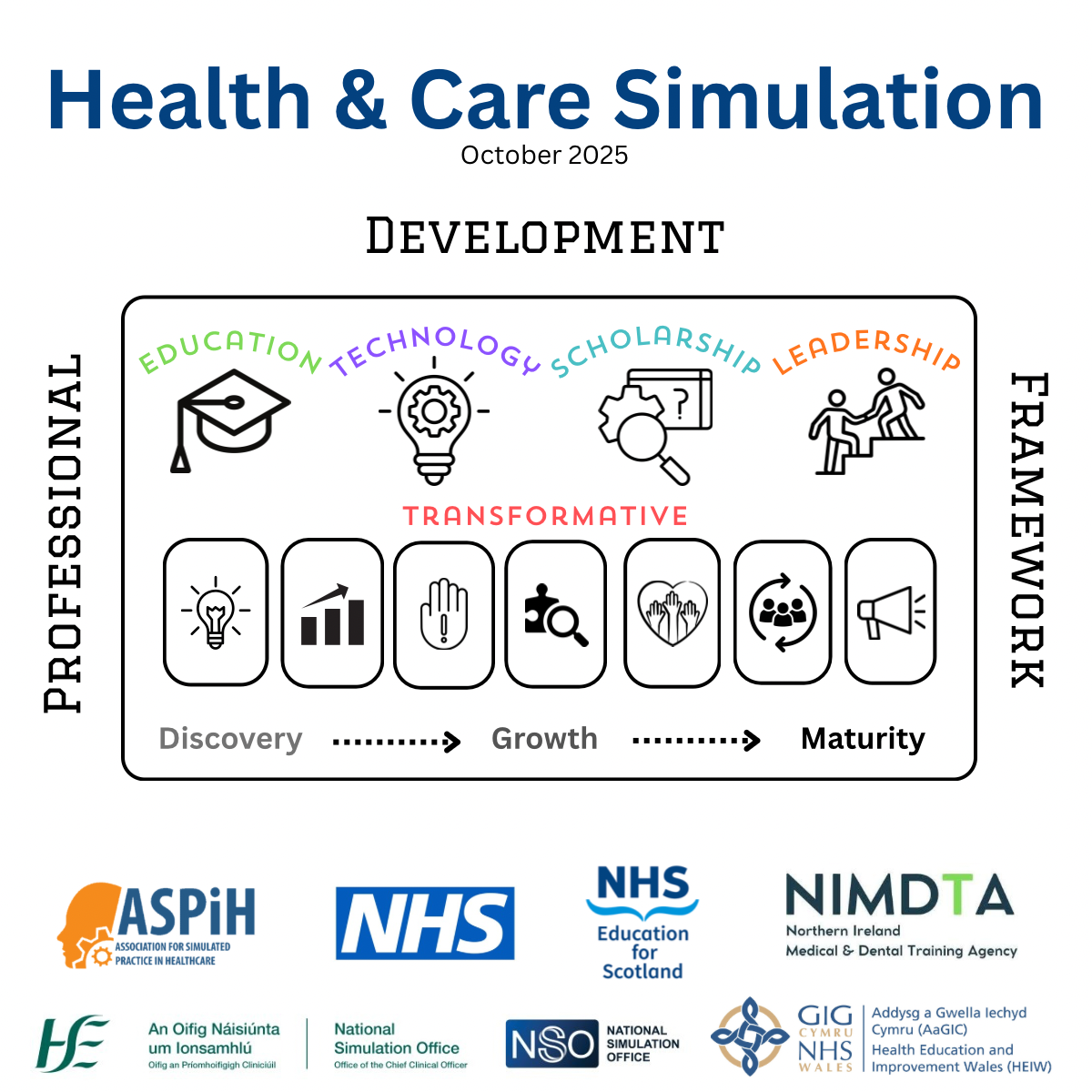Professional Development Framework for Interprofessional Simulation in Health and Care. October 2025
Strengthening capability and clarity across the UK, Ireland, and beyond
We are delighted to launch the Professional Development Framework for interprofessional simulation in health and care.
If we consider simulation in health and care as a constellation, and our workforce as stars, here is how the framework works.
We’re excited to share the first iteration of the Professional Development Framework, a collaborative initiative shaped by stakeholders from across the Four Nations (England, Scotland, Wales, and Northern Ireland), Ireland, and ASPiH.
Developed to support capability progression in simulation-based practice, this framework provides a shared, inclusive structure for individuals, organisations, and systems to build expertise and confidence in simulation, wherever they are on their journey.
It builds on the widely adopted ASPiH Standards for Simulation-Based Practice and has been designed to align with national quality, workforce, and policy priorities across the UK and Ireland.

How it was developed
This framework is the result of extensive engagement with national bodies, educators, clinicians, simulation technicians, programme leaders, and scholars. It reflects a collective ambition to:
- Strengthen the professional development of the simulation workforce
- Optimise the quality, safety, and sustainability of simulation practice
- Support alignment across sectors, regions, and career stages
- Provide a structure that can flex and evolve as the field continues to grow
We gratefully acknowledge the input of contributors to date:
ASPiH
Colette Laws Chapman, Sharon Marie Weldon, Paul O-Connor & Mike Morrow
NHS England
Patricia Howe, Chris Gay, Richard Price, Helen Higham, Bryn Baxendale & Beth Tennant
NHS Education for Scotland
Catie Paton & Andrea Baker
Health Education & Improvement Wales
Sara-Catrin Cook, Bridie Jones, Bethan Bartholomew & Suman Mitra
Northern Ireland Medical and Dental Training Agency
Nicola Weatherup & Marian Traynor
National Simulation Office, Ireland
Dara Byrne & Stephanie Ryng
Framework aims
- Create a structured, inclusive framework for everyone involved in simulation education, leadership, technical support, scholarship, and Transformative Simulation
- Align terminology with the ASPiH Standards for Simulation-Based Practice
- Ensure consistency across the UK and Ireland while enabling local and organisational flexibility
- Remain future-proof, inclusive, and adaptable to emerging technologies, theories, and system priorities
- Reference Four Nations and Ireland programmes, and only cite specific models where they are widely accepted, evidence-based, and relevant to the domain structure (e.g., pedagogical and transformative approaches)
Framework overview
Five Domains of Simulation Practice:
- Educational
- Transformative
- Technology
- Scholarship
- Leadership
Three-Tiered Progression Model:
Based on Cheng et al.’s (2020) model, the levels—Discovery, Growth, and Maturity—are not linear, but designed as a flexible, pick-and-mix structure for development across different roles and contexts.
Guiding Values:
The framework is grounded in ASPiH’s core values of:
- Safety
- Equity, Diversity & Inclusion (EDI)
- Sustainability
- Excellence
It is interprofessional and intended for all parts of the health and care simulation ecosystem.
Opportunities to contribute
As we finalise the framework ahead of formal launch in 2026, we welcome your input.
Ways to get involved:
- Join ASPiH at the annual conference (11–13 November 2025)
- Attend the Stakeholder Engagement Meeting – 12th November, 2pm by invitation only
- Pilot the framework in your organisation (from April 2026)
- Share case studies and examples of practice
- Contribute feedback on the framework’s application and implementation
- Support ongoing refinement and sector-wide alignment
Timeline
- Stakeholder engagement | October – December 2025
- Phase 2 trial site selection | January – March 2026
- Phase 3 trial site launch, feedback & evaluation | April – September 2026
- Finalisation & launch | November 2026
